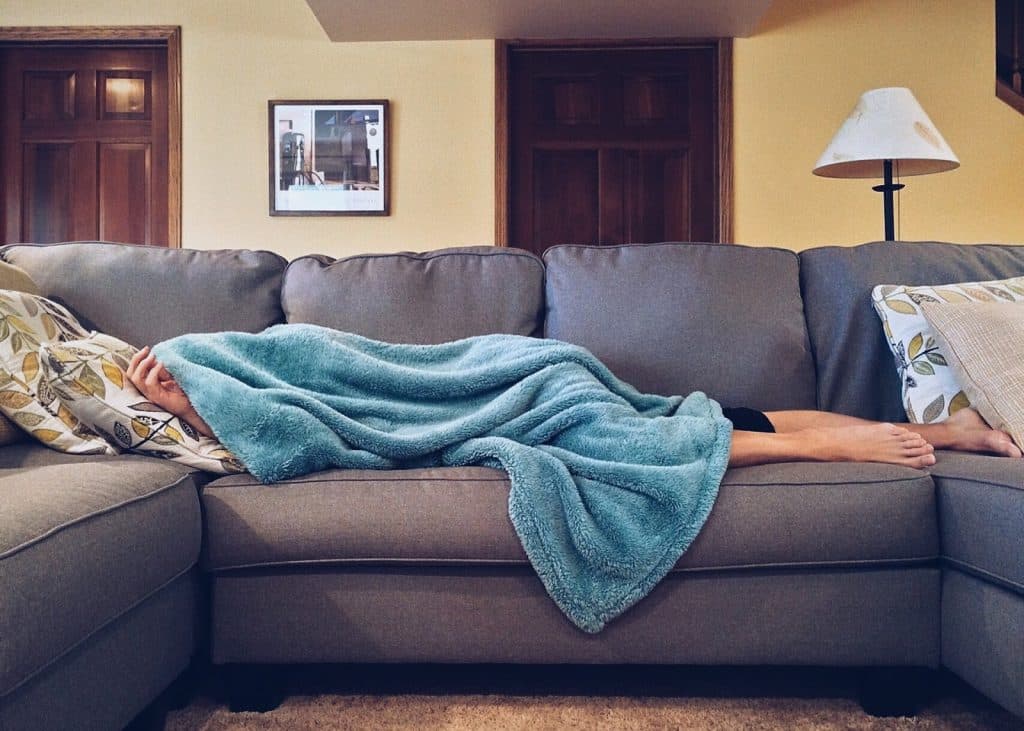Blankets are a handy tool during the winter months. However, taking one in the summer sounds dreadful.
Sure, you can use fans and air conditioning. But what if they stop working? What do you do if you simply can’t sleep without your blanket and see no way to sleep with it?
Why Do I Always Need A Blanket to Sleep?
You can’t sleep without a blanket because your body is very used to sleeping with it. Since your brain has associated it with your nighttime routine, it will find it difficult to relax without it. Also, being covered makes your brain feel safe, so it just prefers having it.
The rest of this article will go over how this sleep onset association comes about as well as explore research that shows blankets are associated with higher serotonin levels which makes you feel safe.
We’ll also go over a few handy tips about how you can overcome this dependence. So keep reading!

#1: Your Mind Associates Blankets with Sleep Time
To your brain, the ideal sleeping conditions are under a blanket in a bed. Your parents probably tucked you in when you were little. Now that you’re an adult, going to bed under a cover has become a habit – a lifelong habit at that.
So when you lie down in bed without a blanket, your brain can’t help but think you aren’t in the ideal conditions. At that moment, your duvet or quilt cover is an essential piece of a puzzle.
You can’t complete the puzzle without it.
Why Does Behavior Association Happen?
Behavior association is an integral part of human psychology. Our brain trains us to react a certain way in a certain situation.
For instance, if you sit at a desk, your mind will automatically put itself in work mode. However, if you’re lounging on a couch, your mind will go into relaxed mode.
Similarly, when you’re in bed, your mind assumes it is time to sleep. If you wrap yourself in a blanket for an extended period as part of your nighttime routine, it will also associate the blanket with sleep time.
You can’t easily go to sleep while sitting upright in a chair unless you’re super tired. A big reason is the circumstances surrounding you at that time aren’t the ideal sleeping conditions.
#2: Blankets are Associated with Serotonin Increases

Another reason why you might not be able to sleep without your blanket is that your mind may be scared of doing so. Since sleeping without a covering can mean stressful or anxious sleep, your body is reacting negatively and protecting itself.
Why does REM Sleep Increase Anxiety?
Let’s take a look at why going to bed can be stressful.
Serotonin (happy hormone) levels drop when you go into a deep sleep. This period of sleep is known as REM sleep. Since serotonin encourages feelings of calm, not having enough of it can be stressful.
Blankets, especially weighted blankets, help mitigate this bad situation. There isn’t a lot of research about why this happens, though.
However, since your blankets are hugging you – so to speak – and being hugged has been shown to make you feel safe, we can assume that the same wheels are turning in your mind.
The heaviness of the bedding may be causing deep pressure stimulation, which activates your parasympathetic nervous system.
This likely leads to an increase in dopamine (another happy hormone) and serotonin production. So if there is a big weight difference between you and your blanket, you may not be able to sleep without it because it makes you feel protected.
#3: Core Body Temperature Drops Later During Sleep
Your circadian rhythm is connected to the temperature, which is why your body temp drops right before you sleep.
It also continues to fall during the night. So even if you feel like you don’t need a blanket when you’re in bed, you’re likely going to want one later on.
Even if you aren’t aware of this information about your REM (rapid eye movement) cycle, your mind will be. To keep your sleep cycle from being disrupted later on, it wants you to keep your blanket on you before you fall asleep.
Read also: Pros and cons of sleeping in a cold room.
Tips to Break Up with Your Blanket
We actually only have 1 tip for breaking up with your blanket. Lifelong habits are harder to break than you might think.
However, we have some great advice (2 tips) on adjusting to living with your choice in bedding without being super hot in the summer.
Here are 3 tips for adjusting your bedding to make it more comfortable:
- Take a hot shower 90 minutes before bed.
- Use a cooled weighted blanket.
- Reduce clothing layers.
1. Take A Hot Shower 90 Minutes Before Bed

Taking a bath 90 minutes before sleeping can help reduce your body’s core temperature and help you sleep faster.
Research by a Ph.D. candidate at The University of Texas shows that when you rapidly heat your body before sleeping, you can sleep quicker and better.
2. Use Cooling Weighted Blankets
Another great technique is to buy a cooling weighted blanket. This kind of bedding gives you the comfort you’re looking for while also ensuring that you stay cool enough.
You won’t be sweating, but you also won’t be anxious. It’s the best of both worlds. The only downside is that you’ll need to spend a bit of money on purchasing one of these blankets.
You can also get cooling pillows to help you fall asleep quickly.
Read also: Do mattress protectors make you sweat?
3. Reduce Clothing Layers
If it is too hot to sleep with a blanket, but you can’t get rid of it, you can just wear fewer clothes to bed.
Think about it – your real issue is that it is too hot. If you sleep in your underwear or nude, you’d feel less hot since there are fewer layers. Having such breathable bedding can make a huge difference.
Read also: Can you sleep on your side with a weighted blanket?
Conclusion: Why You Can’t Sleep Without A Blanket
If you sleep with a blanket for long enough, your body starts associating it with the act of falling asleep.
This association can get bad enough that you may start finding it difficult to relax and convince yourself that it is sleep time without it. Also, blankets (especially weighted ones) are associated with higher serotonin levels.
So if you want a good night’s rest, it is better to get a blanket and prioritize your sleep quality over trying to break up with your bedding.
